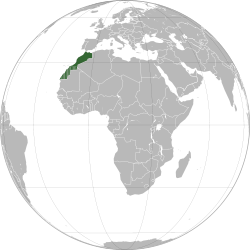Humanitarian Aid, One Of The Pillars Of Morocco Foreign Policy – OpEd
“Morocco is like a tree whose roots go deep into the nourishing soil of Africa and breathes through its leaves rustling in the winds of Europe”! The image was suggested by the late Hassan II, in his book “The Challenge”, published in 1976.
Thirty-seven years later, it is more relevant than ever. This means that Africa has never ceased to occupy valuable space in the hearts of Moroccans. Since the accession to the throne of His Majesty Mohammed VI in 1999, there are countless state visits and work he has performed in several countries of the continent. They mark all the keen interest expressed towards the people of the continent, and mainly reflect a strategic vision, cooperation and friendship centuries. They illustrate especially the success of the fraternal south to south cooperation implemented by Morocco.

Evidenced by the clear desire to contribute to the settlement of crises in recent times in Sub Sahara Africa, West Africa and contribute effectively to their stability. Morocco is willing to do everything possible to promote a constitutional way out in both in Mali and Guinea- Bissau. Both countries have recently seen two new so-called “fronts of destabilization,” the military is being insurgents to seize power by force in defiance of constitutional laws. In the delicate balance that characterizes the Sahel and West Africa, such a violation did not fail to have serious political and institutional.
Moreover, amid Islamist activism deployed by al-Qaeda, the destabilization seems to take on another dimension, a serious turn. The chancelleries of the world can not fail to react to what amounts to a significant breach in the fragile area that now constitutes this strategic region. African and North African governments, without exception, were arrested. The Sahel is nearly five years the soil where successful “open” Islamic terrorism. It is called “gray area” by geopolitics and Western strategists. Perhaps, do we begin to take the true measure of a threat that is sweeping like a specter.
Certainly, the military coup in Mali, followed by a general concern, the offensive and armed conquest by Tuareg of much of Malian territory to which it led, self-proclamation them an “independent republic”, the debut of a new Islamist persuasion, seem to have overtaken all governments, set up against the wall.The emergence of the President of Burkina Faso, ECOWAS mediator appointed by the Inter-intermediation, convictions by the world of crimes committed, the recursive calls return to constitutional order, finally, the willingness to help across a legal issue, do not remain unsuccessful attempts.
The Moroccan intervention in this sense is part of its irreducible commitment to preserving and defending the constitutionality and legality consolidate. Morocco, engaged in the struggle of African Unity, remains faithful to its vocation. Among the early founders of the Organization of African Unity (OAU) in 1962, now the African Union, Morocco has never departed from its historic mission. King Mohammed dispatched military field hospitals to a number of African coutries to provide immediate health care. Tons of food, tents and blankets were sent to Mali, Niger, Congo just to name these few. Moroccan troops are serving in UN peace keeping operations in Africa. The majority of those troops are formed of doctors, nurses and therapists. It is clear that the Morocco’s foreign policy is Africa. A prosperous, democratic Africa is what Morocco is struggling for.
Moroccan Leaves Reaching Out to Syria
King Mohammed VI’s last visit to Zaatari camp at the Jordan Syrian border, the first of its kind of a head of state, has been an undeniable expression of the moral and humanitarian leadership of the King. Since his accession to the throne, King Mohammed has implemented a foreign policy in conformity with the exceptional status occupied by the Kingdom within world nations as a country that is highly respected and always ready to provide humanitarian aid to others whether in Africa, Middle East, Asia and even America (Haiti, Louisiana ..). This credibility has been strengthened, by the testimony made by Secretary of State, Hillary Clinton, who said during the opening ceremony of the Strategic Dialogue between Morocco and the United States that the reforms led by HM the King have set up a true “model” and an “example” for an Arab region unfolded by riots and demonstrations. Morocco stood up as a nation in the region anticipating the percolation of discontent, has attempted to charge in front of reform.
On July 1, 2011 Morocco voted for constitutional change proposed by its King Mohammed VI. These amendments guarantee the full equality of women and the rights of minorities, including Jews. Moreover, these reforms criminalized torture, established the independence of the judiciary and invested executive authority in the head of a party that wins the most seats in parliament. Apparently Moroccos foreign policy favors concrete actions rather than rethoric. If humanitrain aid is needed, Morocco is always the first to respond.
